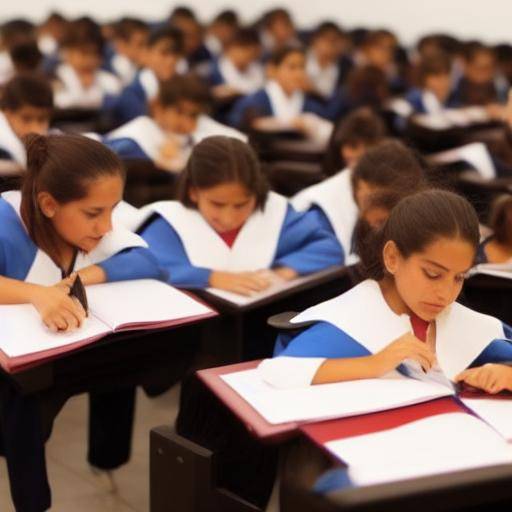
Anxiety is a natural emotion that we all experience in moments of tension, uncertainty or fear. However, when anxiety becomes chronic or excessive, it can have a significant impact on different areas of life, including academic performance. In this article, we will explore in detail how anxiety affects academic performance, its impact on students, and provide practical advice to handle it effectively.
Introduction
Anxiety is a natural response of the body to stressful situations that prepares us to face the danger. However, when this emotion becomes overwhelming and uncontrollable, it can significantly interfere with the cognitive and emotional skills necessary for academic success. This article explores how anxiety can affect students' academic performance, what measures can be taken to address it and how to foster an educational environment that supports students' emotional health.
History and background
Anxiety, in the academic context, has been the subject of interest for decades. From early psychological studies to current research, anxiety has been shown to have a significant impact on academic performance. The first studies focused on the relationship between anxiety and the concentration and memorization capacity of students.
Over the years, it has been observed that anxiety can manifest in different ways in the educational environment, from fear of examinations to social pressure or fear of failure. Efforts to understand and address anxiety in the academic context have led to the implementation of emotional support programs and stress management techniques in educational institutions.
In-depth analysis
Anxiety can affect academic performance in several ways. In addition to causing difficulties in concentrating and remembering information, it may cause mental blockages during examinations or presentations, lower self-esteem and trigger procrastination patterns. Protracted anxiety can also affect students' physical and emotional health, which in turn influences their academic performance.
Current research has highlighted the importance of implementing effective strategies to manage anxiety and improve academic performance. In this regard, training programmes have been developed on coping skills, relaxation techniques and mindfulness, and educational approaches focused on stress reduction.
Comprehensive review
To address anxiety and improve academic performance, it is essential to implement a holistic approach that encompasses both emotional well-being and effective learning strategies. Some of the best practices include the promotion of an educational support environment, the implementation of stress management techniques in the curriculum and the availability of emotional support resources for students.
Experts agree that prevention and treatment of anxiety in the academic environment require close collaboration between educators, mental health professionals and students themselves. Promoting an open dialogue on anxiety, offering coping strategies and providing an empathic environment can help reduce the negative impact of anxiety on academic performance.
Comparative analysis
The relationship between anxiety, impact on academic performance and management strategies is a multidisciplinary study area covering psychology, education and mental health. Developing a holistic understanding of this relationship allows us to identify effective interventions, understand the complexity of individual experiences and promote healthy and comprehensive educational environments.
Applicable practical advice and advice
For students who experience anxiety in the academic environment, it is crucial to seek support and develop personal strategies to manage stress. Some practical recommendations include the regular practice of relaxation techniques, the early planning of the study and the search for professional help if anxiety significantly interferes with academic performance.
Industry ideas and expert opinions
Educational psychology and emotional health experts agree on the importance of addressing anxiety in the academic environment. Comprehensive approaches that recognize the interconnection between emotional health and academic performance are critical to creating healthy and supportive educational environments.
Case studies and applications in real life
The case study of a student who experiences anxiety in the academic environment can provide a deep insight into the challenges they face, as well as the effective strategies they can use to manage anxiety and improve their performance.
Future trends and predictions
As awareness of the importance of emotional well-being in the educational environment continues to grow, more effective interventions are expected to be developed and implemented to address anxiety and its impact on academic performance. In the future, educational institutions are expected to place more emphasis on the emotional support of students and the implementation of holistic programs that promote mental health.
Conclusion
Anxiety can exert a strong influence on students' academic performance. Recognizing this impact and effectively addressing anxiety not only promotes the emotional well-being of students, but can also significantly improve their academic performance. By creating educational environments that prioritize emotional support and provide effective strategies to manage anxiety, we can help students achieve their maximum academic potential.
The relationship between anxiety and academic performance is complex and multifaceted, but by adopting a holistic approach that recognizes the interconnection between emotional health and academic success, we can work towards more comprehensive and enriching educational environments.
Frequently asked questions
How can anxiety affect a student's academic performance?
Anxiety can affect academic performance in various ways, including difficulty concentrating, remembering information, facing evaluation situations, and maintaining a healthy self-esteem. In addition, prolonged anxiety may have negative effects on the emotional and physical health of a student, which in turn influences their academic performance.
What strategies can help students manage academic-related anxiety?
Some effective strategies to manage anxiety in the academic environment include the development of coping skills, the regular practice of relaxation techniques, the early planning of the study and the search for professional help if anxiety significantly interferes with academic performance.
How can educators support students who experience academic anxiety?
Educators can support students who experience academic anxiety by creating an educational support environment, fostering an open dialogue on anxiety, offering coping strategies and providing an empathic environment that recognizes the complexity of individual experiences.
What is the role of emotional health in academic success?
Emotional health plays a key role in academic success, as it influences the capacity of concentration, memory, decision-making and stress management of students. An educational environment that prioritizes emotional support can promote the well-being of students and improve their academic performance.
What is the long-term impact of anxiety on academic performance?
The long-term impact of anxiety on academic performance can be manifested in continuous difficulties with stress management, low self-esteem, and limitations on academic and professional achievement. Addressing anxiety effectively can help prevent long-term impact and promote healthy academic and personal development.
How can parents support their children who experience academic anxiety?
Parents can support their children who experience academic anxiety by providing a home support environment, fostering healthy stress management habits, and recognizing and validating their children's concerns and fears. In addition, seeking guidance from mental health professionals can be critical to providing adequate support.
In short, anxiety can have a significant impact on students' academic performance, but with appropriate support, effective stress management strategies and a holistic approach to emotional health, it is possible to mitigate this impact and create educational environments that encourage students' academic and emotional success.
This article has explored in depth the relationship between anxiety and academic performance, providing detailed information, applicable strategies and the perspective of experts in the field. By addressing anxiety in the academic environment in a comprehensive manner, we can work towards a more understanding, effective and enriching education for all students.
Remember that if you or someone you know is experiencing anxiety related to the academic environment, it is essential to seek professional support. You are not alone, and there are effective resources and strategies available to help you manage anxiety and achieve your maximum academic and emotional potential.






















































